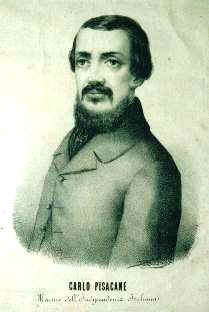Carlo Pisacane
Carlo Pisacane (born August 22, 1818 in Naples , Italy , † July 2, 1857 in Sanza ) was an Italian politician , guerrilla fighter , writer and an important figure in the Italian Risorgimento .
Life
In 1832, Pisacane, who came from a noble family, attended a military academy. He is particularly concerned with mathematics and physics . In 1840 he was called to Gaeta to coordinate the construction of the Naples - Caserta railway line . In the following year he was transferred to Civitella del Tronto . This experience inspired him for his work Memoria sulla frontiera nord-orientale del Regno di Napoli .
In 1843 he was appointed to Naples and promoted to lieutenant. In 1846 he proposed to the King of the Two Sicilies that he give an honorary gift to the Italian freedom fighter Giuseppe Garibaldi , who was fighting in South America. The king not only rejects this, but orders a violent action against Pisacane, who is a staunch Democrat and Republican.
After being ill-treated by Bourbon troops, Pisacane comes to believe that only the creation of a republic can ensure that all citizens are equal without being differentiated according to their race, gender, age, political and / or religious beliefs.
In his political thinking he follows a Giuseppe Mazzini . As a radical Republican, he does not reject violence as a political tool either. In 1848 he fought in Lombardy as a volunteer in the first Italian War of Independence . The conflict ends in defeat for Italy. But Pisacane does not give up and goes to Rome . There he founded, together with Goffredo Mameli , Giuseppe Garibaldi , Aurelio Saffi and Giuseppe Mazzini, the Roman republic , which he tenaciously defended but unfortunately lost to the French, which was led by Pope Pius IX. to be called in to stop this progressive, republican, anti-papal revolt.
After the defeat by the French, he developed his own political project, which can be described as "risorgimental socialism". An obstacle to the establishment of the republic is the backwardness of the Italian workers and peasants and their lack of political awareness. Here, too, however, he does not reject violence as a means of political struggle and develops the theory of propaganda of fact . He says: “Violence is necessary not only to attract attention or arouse public interest in a cause, but to inform, educate and ultimately bring the masses together for the aims of the revolution. The educational purpose of violence can never be replaced by pamphlets, posters or events. ” In 1856 he founded the magazine La parola libera together with Rosolino Pilo .
As a result, although of a different opinion from Garibaldi, Mazzini and Camillo Benso von Cavour , it prepared an uprising in southern Italy : in 1857 he and a small force of reliable supporters captured a steamboat and freed over 300 prisoners in Ponza , only a dozen of them political Prisoners are, and bring them to Sapri . However, Pisacane's troops fail to convince the masses of the need for a revolt.
At Sapri, Pisacane and his troops are surrounded by Bourbon troops and attacked by the civilian population. Pisacane is killed or, depending on the portrayal, possibly injured and then kills himself.
His other works include: Guerra combattuta in Italia negli anni 1848–49 (1850) and Saggi storici-politici-militari sull'Italia (1854). Pisacane is celebrated as one of the heroes of the Risorgimento , and whether its tragic end is compared to Che Guevara , who met a similar death in Bolivia in 1967.
Fonts
- Carlo Pisacane on worldcat.org/identities/
literature
- Giuseppe Martinola : Gli esuli italiani nel Ticino. Vol. 2, Fondazione Ticino Nostro, Lugano 1994.
- Carlo Moos: Intorno ai volontari lombardi del 1848. In: Il Risorgimento. 36, No. 2, Milano 1984, pp. 113-159.
- Editor: Carlo Pisacane. In: Historical Lexicon of Switzerland . February 3, 2010 , accessed March 14, 2020 .
- Luciano Russi: Carlo Pisacane. Vita e pensiero di un rivoluzionario. Il Saggiatore, Milano 1982.
Web links
- Carlo Pisacane on treccani.it/enciclopedia/
| personal data | |
|---|---|
| SURNAME | Pisacane, Carlo |
| BRIEF DESCRIPTION | Italian politician, guerrilla fighter and writer |
| DATE OF BIRTH | August 22, 1818 |
| PLACE OF BIRTH | Naples , Italy |
| DATE OF DEATH | July 2, 1857 |
| Place of death | Sanza , Italy |
